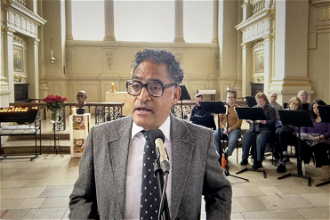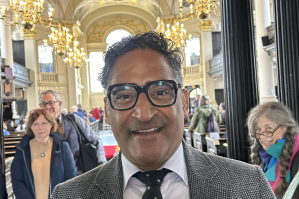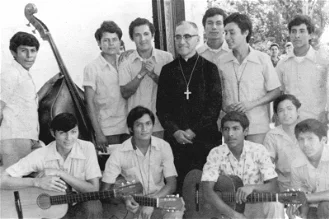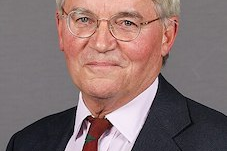Text: The Prophetic Imagination - St Oscar Romero
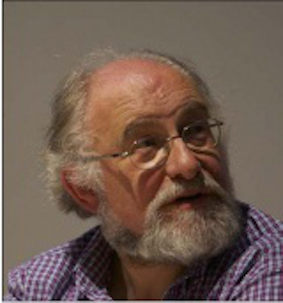
David McLoughlin
David McLoughlin gave the following address at the Ecumenical Service in St Martin in the Fields, London for Romero Week 2019 on Saturday 16 March 2019
A reading from the prophet Isaiah Isaiah 43: 16-21
Thus says the Lord , who makes a way in the sea, a path in the mighty waters, who brings forth chariot and horse, army and warrior; they lie down, they cannot rise, they are extinguished, quenched like a wick: "Remember not the former things, nor consider the things of old. Behold, I am doing a new thing; now it springs forth, do you not perceive it? I will make a way in the wilderness and rivers in the desert. The wild beasts will honour me, the jackals and the ostriches, for I give water in the wilderness, rivers in the desert, to give drink to my chosen people, the people whom I formed for myself that they might declare my praise."
As with Isaiah in his time so in every age we need men and women who open up for us the prophetic imagination of a Moses at the burning bush, or Hosea and Amos in a time of national crisis and of Jesus in his time. Always the prophet speaks out in times of lament, of crisis, or accommodation, or forgetfulness when the original vision has grown dim and is now packaged into controllable parcels. When the access to the divine message has become re-interpreted, controlled by elites, spiritual, political or academic.
The prophet is rarely obvious from their early life. Moses was a member of the elite ruling class, Isaiah is a court prophet without a king, an exile in Babylon along with Ezekiel. But they are called to see anew, to keep the prophetic imagination of exodus and covenant alive. To remember and encounter again the strange God, (Yahweh) I am who I am, I will be who I will be, I will be where I will be, who from the beginning escapes definition and description, confinement or manipulation.
With the decline of Babylon and the emergence of Persia and it's shrewdly tactical, inclusive, ruler Cyrus, Isaiah raises again the hope of a renewed exodus and a return to the land, to live out anew, in full, the call to a free covenant with this strange free God. The years in exile have allowed Isaiah and others to gather the traditions and memories of the people, to re-imagine what that new Promised Land was meant to be. They gather these memories into the texts we call the Pentateuch or the Hebrew bible. The time of brutal exile and loss had stripped away inessentials. There is the possibility of a return with renewed vision and a renewed purpose.
When Jesus started his ministry he faced a land where the rule of Rome underpinned and undermined the outwardly Hebraic traditions. But the Temple was compromised, the aristocracy were colluding with imperial authorities and the only reform movements were so pure that the people of the soil, the mass of peasant workers, could not follow their laws and dictates; e.g. the 300 plus priestly rules adopted by the radical Pharisees. There was a lot of law, orthodoxy, right thinking, but the prophetic imagination had been lost.
Jesus very first public teaching in the synagogue at Nazareth proclaims his renewal of that prophetic imagination in his time. Luke has this already heralded by his mother to be and her old cousin Elizabeth when their two voices rise in a harmony of the prophetic imagination of their people. "My soul glorifies the Lord my spirit rejoices…he puts down he mighty from their thrones and raises up the lowly. The hungry he fills with good things the rich he sends empty away…." Mary's Magnificat, which Oscar Romero prayed every day of his priestly life, renews the prophetic vision of her people and her son will flesh it out.
Oscar Romero is an unlikely prophet. His virtuous, cautious, studious formation in the seminary and University in Rome, with its in-depth study of a deductive theology, starting from abstract principles but with an inevitable and inexorable inner logic, lacked all passion or relevance. He and thousands of young seminarians learnt all the answers to questions no-one was asking. Alongside this he imbibed a spirituality that was either the discipline and effort of mental prayer focused on heaven or else a gently affective and emotive focus on the lives of the saints and the motherly care of Mary, mother of Jesus, mother of the Church and of course Mother of the priest. But not the powerful prophetic Mary of the magnificat, prophesying the bringing down of the powerful and the raising up of the destitute and powerless - a true daughter of Is-ra-el the people of the God. The strange free God capable of reversing things, capable of initiating the new.
The true life of a faithful servant of the church was neatly summarised in aphorism as: Virtus stat in media via. (Derived from Aristotle's advice to his son Nichomachus in the Nichomachaen Ethics later used extensively by Aquinas on his treatment of virtue . Cf. ST ii-ii q.146, 1 arg. 3). Virtus stat in media via -i.e. the good or the virtuous way is always the moderate, the middle way, between extremes; enthusiasm of any sort is to be avoided. This was the vision commended to Oscar for him to conform to in his training. This was the underlying meaning of the original interpretation of his motto Sentire cum Ecclesia. To think rightly, always, as the Church thinks. Hardly the cry of a prophet!
The Neo-Scholastic theology, the theology of the Catholic Colleges and Universities of the time, which he learnt, was in the form of theses, question and answers. However the questions had no particular social, political, or economic context. In Rome students from all over the world, from Chicago, Coventry, Calgary, Calcutta, Kinshasa, Bucharest, Lisbon and even Cuidad Barrios - learnt the same questions and the same answers. Answers to questions that no-one in their own countries and communities and certainly none of the poor, the hungry, the destitute of the world were asking.
But over the years of working with very particular, very real, people in very particular, real places Romero began to read the gospel from their questions and things began gradually to change. He began to see differently and feel differently. He had always worked with and for the poor, out of a deep and profound charity, out of love for them. But as a young busy dutiful priest and then administrator Bishop he had not asked the question: Why are the poor poor; what is it in society that allows a minority to hold such total power over the way things are, a monopoly over wealth and wealth production? He had never considered the structural sin in his world.
Indeed initially he was afraid that such questions being asked by the Jesuit theologians, like Ignacio Ellacuria or Jon Sobrino, were too political and too materialist. The subtle carefully balanced distinctions of Aquinas and others between the natural and the supernatural, the body and soul, the Church and the World, the spiritual and material had in his formation been taught to him as separations. It would take time and new experience to see such separations as incompatible with the incarnate presence of God's Word and Spirit within the world.
The depth of the conflict between the prophetic imagination of Jesus, his vision of God's reign, and the controlling manipulative oppressive powers of this world, had not yet become clear or painful enough for Romero. But his unexpected appointment as Archbishop, to the capital of San Salvador, brought him personally up against the extremes of wealth and poverty in a new way, and the death of his friend Fr. Rutilio Grande and his companions, and the lack of concern of the civil authorities made these question brutally near, like no scholastic theology thesis ever had. And now the other meaning of his motto Sentire cum Ecclesia - to feel with the Church - became more insistent.
And in the meantime in the light of Vatican II's teaching on the Church in the Modern World, and the South American Bishops teachings at Puebla and Medellin and their deliberate emphasis on a preferential option for the poor, his sense of the Church itself had changed. The emphasis had shifted from the right thinking community under the rightful authority of the magisterium, to feeling and thinking alongside and with the pilgrim people of God in their journey in history and in the midst of their joys and sorrows, their hopes and fears, in the context of political, social, and economic forces and structures that in some sense could be called sinful.
The scriptures and his preaching ministry opened up anew as he re-read Moses encounter with the strange God, so much stranger than in the certainties of his roman theology with its seemingly clear coherent treatises of De Deo Uno (On the One God) and De Deo Trino (On the Tri-une God). Two separate, technically dense courses, on the reality of God taught differently by different Professors and which never quite came together!
Now Oscar learnt anew from the prophets and above all from the Mary of the Magnificat and the Jesus of the parables of the bias of this strange liberating God. The bias towards the oppressed, the frail, the nobodies, the widow, the stranger, the orphan, the powerless ones. Jesus' re-working of this prophetic imagination flamed out from the pages of the Gospels anew - with the power of his opening statement in the charter of discipleship, the Beatitudes - "Blessed are the destitute (ptochoi) for theirs is the Kingdom of God." They don't have to win or achieve it. It is theirs because God chooses to align God's strange self with them. Oscar sees this is not just in heaven but is a real space here and now into which all are invited. A real space which Paul calls Grace. So different from the graces Oscar had been taught about which would be drip fed to the virtuous.
If that is the case, if the God of Exodus, the God of Jesus, was to be experienced in transcendent freedom alongside the oppressed, then where should a bishop stand but alongside them in the space of grace. If all are created male and female in the image and likeness of God then to wound, oppress, and destroy one of the least of these little ones is to commit the greatest offence against that free creative liberating God. A far greater sin than the sins against any doctrinal orthodoxy, or sins of failure in one's private personal spiritual struggle, over which Oscar had been so scrupulous.
If the prophetic imagination of Jesus reveals a free self-emptying of the creator liberator God, to share the life and limits and hungers and fears of a Palestinian craft worker, what does that demand of a contemporary bishop? Romero in the last three amazing years of his life in an increasingly focused way lived out what pope Francis now preaches. Romero was the shepherd who smelt of his sheep, and lived and prayed and felt with the church as a member of staff in a field hospital rather than an ecclesiastical bureaucrat engaged in keeping a false peace, maintaining a blasphemous status quo.
In the prophetic imagination that runs throughout the Jewish Christian scriptures what we now call the preferential option for the poor, God coming again and again alongside the nobodies and declaring them is-ra-el the people of God, is a golden thread. It is this thread that Romero grasps ever more tightly. He begins to know ever more deeply the nature of the strange God of exodus as he gets to know ever more intimately his own suffering people.
In doing this he leaves aside the simple certainties of the theology he learnt in Rome and faces what he called "the events of the week". The realities before us, that no theology can anticipate or provide neat answers for. His radio homilies became one of the few ways that his people could find out what was really happening in their city, and their country; where a state controlled press consistently produced censored and deliberately slanted false news. Now the reality, the events of the week, was deliberately brought into tension with the prophetic imagination of the scriptures and of Jesus parables of God's living presence, the Kingdom.
With Oscar's help we could see what was real. We could imagine how under the God of creation and liberation, the God of the new, it might be different. And together we could work to realise that vision of God's will for all people in our reality. Theology was now not so much right thinking, the right answers to those right questions, set down so clearly and tightly by the right thinkers who did our thinking for us, but rather theology was shared, engaged, inspired right action emerging from the reality of the people's lives. For Romero this came to be to live in the style of Jesus. His life continues to provoke us to re-imagine this in new contexts.
That this caused a serious backlash both within the elites of his society, and among fellow bishops who had not gone through this conversion, we all know. Like Pope Francis after him he is called a Marxist and much worse. But then his Lord was called a glutton and a drunkard! In following through the prophetic imagination, that now inspired him, he began to see the mass of his own people as radically one with the crucified Christ; with the God who, as Paul tells us, out of love enters into the darkest that we can create or experience e.g. in Jesus the killing of innocent life by a corrupt state and the denial of the presence of the living God by religious leadership. After the cross there is no dark place anymore where God cannot be for us.
It will be this theme that the great liberation theologian Jon Sobrino, once criticised by Romero and latterly his friend, supporter and collaborator, will take up and develop in some of the finest theology written in our times. In doing so he turns the prophetic imagination of Oscar, lived generously till a brutal death, into a great cry of hope for us and our world. And invites us to see, and feel, and engage together anew.
I end with the words of our Saint read to us earlier:
"I ask all of you, dear brothers and sisters, to view these things that are happening in our historical moment with a spirit of hope, generosity, and sacrifice. And let us do what we can."
May it be so!
David McLoughlin is Emeritus Fellow of Christian Theology at Newman University, Birmingham. B32 3PD.



